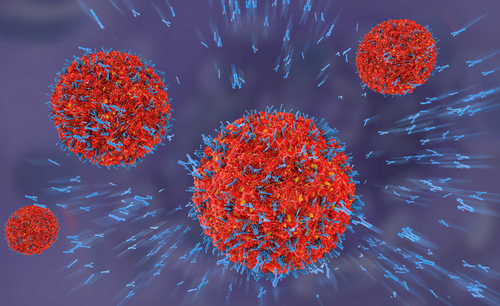B-cell Protein May Contribute to Development of Primary Sjogren’s Syndrome, Study Suggests
Written by |

People with primary Sjögren’s syndrome (pSS) have significantly higher levels of CD72 — a regulatory protein on B-cells, a type of immune cell associated with pSS — than healthy peers, according to a study from China.
Data also highlighted an association between CD72 levels and those of IgG — a marker of B-cell activity associated with autoimmunity — in pSS patients, suggesting that abnormally high levels of CD72 may contribute to the disease.
Nevertheless, further studies are needed to clarify CD72’s role in pSS, the researchers noted.
The study, “A regulatory role for CD72 expression on B cells and increased soluble CD72 in primary Sjogren’s syndrome,” was published in the journal BMC Immunology.
B-cells are a type of immune cell that fight infections through the production of antibodies, proteins that can bind to their targets, such as bacteria and viruses, with high specificity.
B-cell abnormalities are a hallmark of pSS and contribute to the development and progression of the disease. These abnormalities include changes in B-cell subsets, B-cell hyperactivity, hypergammaglobulinemia (abnormally high levels of antibodies, namely IgG, in the blood), and the production of self-targeting antibodies — called autoantibodies.
CD72, a protein found on the surface of B-cells, can promote both positive and negative effects on B-cell function. Abnormal levels of CD72 on B-cells and in the blood (non-attached to B-cells) have been associated with the development of several autoimmune diseases, including lupus and multiple sclerosis.
However, the role of CD72 in pSS remains poorly understood.
Now a team of researchers in China has evaluated whether CD72 levels (on B-cells and in the blood) are changed in pSS patients and their potential association with patients’ clinical features — namely blood levels of IgG and anti-SSA autoantibodies.
The study included 60 pSS patients — 55 women and 5 men — with a mean age of 46.9, and 61 gender- and age-matched healthy individuals (the control group).
Results showed that pSS patients had significantly higher levels of CD72-positive B-cells and of CD72 in their blood than healthy peers. This increase in CD72-positive B-cells was consistent with data from a small previous study in pSS patients, the researchers noted.
The team noted that an association between higher-than-normal blood levels of CD72 and higher disease activity and severity also was found in lupus patients.
“Such upregulation of [CD72 in the blood] might be due to the dysregulation of B-cells and more intense shedding of CD72 from the membrane of B-cells in response to stimulation,” the researchers wrote.
This increase in CD72 blood levels may represent B-cell hyperactivity.
Overall, “these observations suggested that CD72 positively regulates B-cell functions in pSS and its [presence on] B-cells is associated with the hyperactivity of B-cells in pSS patients,” the team wrote.
Future studies are needed, however, to evaluate the specific role of CD72 in the development and progression of pSS.





